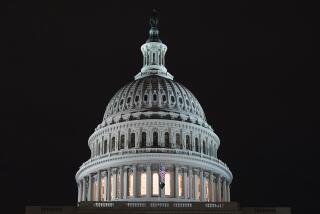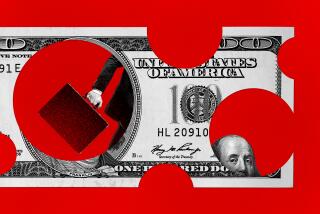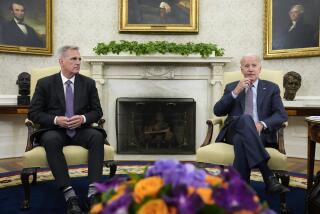$12 Billion Is Cut From S&L; Cleanup Bill : Thrifts: A key House panel, with the Administration’s blessing, pares the $42-billion request for funds.
- Share via
WASHINGTON — A key House panel voted Thursday to slash $12 billion from the Clinton Administration’s request for funds to complete the selloff of failed savings and loans.
The Administration gave its political blessing to the reduced amount--down from $42 billion-- as having the best chance of final approval by the full House, which has been reluctant to approve enough money to finish the S&L; cleanup.
The reduced figure for cleanup funding is “reasonable and fair,” said Rep. Herbert C. Klein (D-N.J.), co-author of a bipartisan amendment that was adopted by the financial institutions subcommittee of the House Banking Committee.
The vote provided $18 billion for the cleanup of insolvent thrifts under government control. Later, another $12 billion was approved on a contingency basis for a new insurance fund that will protect S&L; deposits. But this $12 billion will be available only if federal regulators certify that the healthy segment of the S&L; industry cannot generate enough profit to support the insurance fund.
Even the Clinton Administration’s champions on the funding issues acknowledge the difficulty of winning a majority in a House with 110 new members. Many ran as staunch critics of the RTC, which has been criticized for years as inefficient and inept.
“I know this is an unpleasant, unwelcome task,” said Rep. Stephen L. Neal (D-N.C), the subcommittee chairman. “It should have been completed in the last Congress. (But) we must face up to this responsibility.”
The full House rejected a major funding request last April, leaving the Resolution Trust Corp.--the federal agency handling the cleanup--unable to shut down some of its crippled institutions and complete the sale of their mortgages, real estate and other assets.
The RTC is now getting higher prices for the assets it sells, and the cost of interest on the bonds used to finance the cleanup is lower than expected. So is the cost of keeping crippled institutions open while awaiting final funding from Congress.
However, the declining cost of the bailout may make funding approval even harder, some congressional members believe. “This is going to be hard to pass,” said Rep. Charles E. Schumer (D-N.Y.), a veteran committee member.
Congress has already spent about $87 billion on the cleanup. The Clinton Administration first asked Congress for another $45 billion, then reduced that to $42 billion after the General Accounting Office said the RTC was likely to get better than expected prices when it sells assets in today’s improved investment climate.
The Senate Banking Committee accepted the Administration’s first estimate and voted for $45 billion earlier this year. But the House persisted with its tradition of skepticism, and the vote on funding was delayed while subcommittee members sought ways to trim it.
After GAO officials told House subcommittee staff members in private that the cost could be far less than anticipated, it became obvious to the Administration that it would be futile to seek the full $42 billion.
The full House Banking Committee is likely to consider the bill within the next several weeks.
More to Read
Get the L.A. Times Politics newsletter
Deeply reported insights into legislation, politics and policy from Sacramento, Washington and beyond. In your inbox three times per week.
You may occasionally receive promotional content from the Los Angeles Times.










